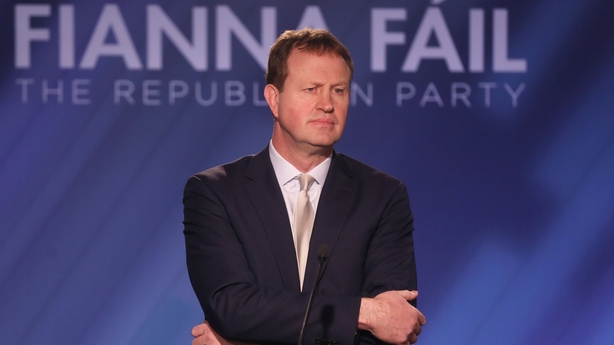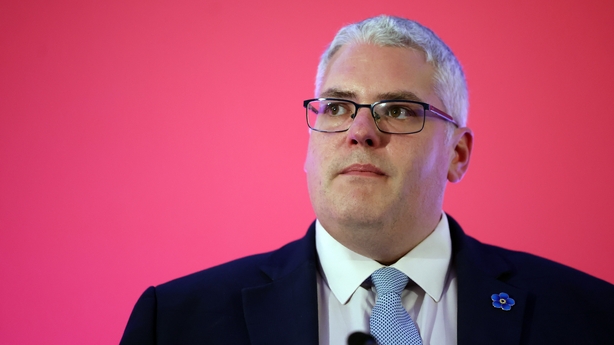DUP leader Gavin Robinson has said he shares the fears of relatives of the 29 people killed in the 1998 Omagh bombing by dissident republicans, that a UK inquiry will not get to the truth of what happened unless the Irish Government establishes a parallel process.
He also said that a failure to establish a parallel inquiry would be "an intolerable shame".
"I think anybody who has taken the opportunity to watch or listen to the harrowing testimony of individuals who lost loved ones or who were injured themselves over the last four weeks in the UK inquiry will know that there is an earnest demand that families get access to truth, that they understand what happened.
"And of course, those questions apply on both sides of the border. There's no longer more time required for honeyed words or solemn sorrow.
"It is time for the Irish Government to act.
"It's time for the Taoiseach to recognise that his Government, that his State, have questions to answer, materials to provide and individuals who may have eyewitness testimony, who may have direct involvement in intelligence that was available at the time, but the inquiry we have has no power to compel them," Mr Robinson said.
Lawyers representing a number of the families have expressed concern that the UK inquiry cannot compel potentially vital witnesses from the Republic to appear.
They believe former members of the Defence Forces, military intelligence and gardaí who were monitoring the activities of dissident republicans at the time of the atrocity could have vital information.
The car used in the Real IRA attack in August 1998 was stolen in Co Monaghan, the bomb was built in the Republic and many of those involved lived across the border.
Justice minister concerned about separate inquiry
The Government has pledged co-operation with the UK inquiry but has repeatedly insisted there is no need for a parallel process.
Minister for Justice Jim O'Callaghan has expressed concern about establishing a separate inquiry.
He said his that what happened in Omagh was "horrific" and his department is co-operating with the inquiry in Northern Ireland and that a memorandum of understanding is being finalised in respect of ensuring that any relevant evidence in the South is provided to the inquiry.
"I've concerns about establishing a separate inquiry down here. There's one inquiry that is being conducted at present. The Irish Government is going to co-operate with it," he said.
"The Irish Government is going to co-operate with it, we are co-operating with it and I think that’s where all our focus should be."

Earlier this month, former minister for justice and minister for foreign affairs Charlie Flanagan told RTÉ News he now agrees with the families that there is a need for a parallel inquiry with the power to compel witnesses.
Over the course of four weeks the UK inquiry, sitting in Omagh, heard harrowing evidence from the relatives of all of those killed in the attack, a number of survivors who were seriously injured, and several witnesses.
A number of them said the Irish Government must co-operate fully in the inquiry is to fulfil its remit to examine whether the atrocity could have been prevented.
Dissident republicans were involved in around 30 bombings and attempted bombings across Northern Ireland in the two years before Omagh.
Four years ago a judge at the High Court in Belfast ruled that there was a real prospect that the bombing could have been prevented and he called for fresh investigations on both sides of the border.
Lawyers for families say public inquiry in Republic needed
The UK inquiry's lawyer has said it believes a memorandum of understanding dealing with the disclosure of potentially relevant Irish state materials will be signed next month.
But lawyers for the families have said access to materials does not go far enough.
They insist that a public inquiry in the Republic is necessary to facilitate the hearing of evidence from people who live across the border, or in some cases to compel them to give evidence and provide relevant documents.
"Whether it's the Irish Defence Forces, An Garda Síochána or the intelligence services - there was information available, there was action taken, there was a knowledge of the precursor events and events that ran up to Omagh that will be hugely important to assessing the truth in this inquiry, hugely important for the family's quest for truth," Mr Robinson said.

"This inquiry, as we know in Omagh, is looking over a period of around two years and looking at a litany of terror attacks in Northern Ireland, including Banbridge and Lisburn and Moira and Newry and many others.
"Over the course of that two year period the bombs were constructed in the Irish Republic, the bombs were transferred from the Irish Republic into Northern Ireland, the activists or the participants involved in those acts of terror were known to the state.
"In the Irish Republic, actions were reportedly taken by elements of the State, whether it's the guards, the Defence Forces or the intelligence services, to frustrate those operatives, and yet the bomb got through.
"And so unless there's an inquiry in the Republic of Ireland, we will only get a partial picture.
"There needs to be an inquiry in the Irish Republic. It needs to have the power to compel witnesses, to take evidence and to answer the questions these families are asking."
DUP leader willing to meet Taoiseach and Tánaiste
Mr Robinson said the UK inquiry established to examine whether the attack could have been prevented will not be able to establish the truth without a parallel process.
The DUP leader said he is willing to meet Taoiseach Micheál Martin and Tánaiste Simon Harris to discuss the issue and to have the opportunity to reinforce the need for such an inquiry.
"Over the last four weeks, there's a new generation of individuals in Northern Ireland and in the Republic who now understand the horrors of 1998.
"They understand the horrors of Omagh, but none of them can understand why any political leader in the Republic would stand in the way of truth," he said.
"I'm deeply fearful, and the families are too, that this process could conclude in the end with Lord [Alan] Turnbull saying I couldn't make an ultimate finding because the Irish Government didn't make information available, didn't make witnesses available, and we couldn't, to the full extent of legal provisions in our jurisdiction, establish the truth.
"That would be an intolerable shame and a shame that I believe no Taoiseach or Tánaiste could stand over."






